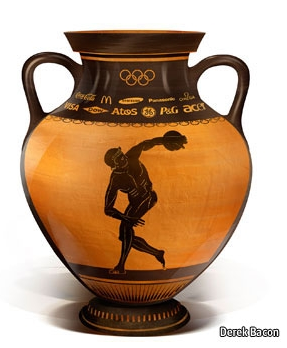(单词翻译:单击)

For advertisers, the Olympics should be a bonanza. Martin Sorrell, the boss of WPP, a British ad firm, often talks of the boost the global ad market receives when the Olympics, an American presidential election and the Euro football tournament more-or-less coincide every four years. Michael Nathanson of Nomura, an investment bank, predicts that the Olympics will pump up the American ad market by between $800m and $1 billion this year. The global bump in advertising will be $1.3 billion, reckons Jonathan Barnard of ZenithOptimedia, a consultancy.
对于广告商来说,奥运会应当是一次发财的机遇。每隔四年,奥运会、美国总统选举和欧洲杯或多或少都会存在时间上的重合。英国广告公司 WPP 的老板 Martin Sorrell 常常谈及由此带来的全球广告市场热潮。投资银行野村证券(Nomura)的 Michael Nathanson 预测今年奥运会将提高美国广告市场的收入,幅度约在8亿至10亿美元之间。咨询公司 ZenithOptimedia 的 Jonathan Barnard 预计全球广告收入增长将为13亿美元。
Others are more cautious. Non-sponsors assume that, if they advertise during the games, their message will get lost in the hubbub, says Ian Whittaker of Liberum Capital, a bank. He predicts that many will wait until September, and that the Olympic boost will be less than expected.
其他人则更为谨慎。Liberum Capital 银行的 Ian Whittaker 表示,非赞助商认为如果在赛事持续期间做广告,他们的商品信息将湮没于一片喧嚣嘈杂之中。他预测许多非赞助商将等到九月,而奥运广告浪潮也将不如预期那么火热。
Governments of countries that host the Olympics usually boast that the games will generate vast economic returns for the nation. David Cameron, Britain's prime minister, promised to "turn these games into gold for Britain", to the tune of £13 billion over four years (see article). Several studies suggest that is unlikely. Victor Matheson of the College of the Holy Cross in Massachusetts finds that organisers of big sporting events tend to overestimate the benefits and underestimate the costs.
主办奥运会的各国政府常常吹嘘奥运赛事将为国家带来巨大的经济回报。英国首相戴维·卡梅伦许诺"为英国把赛事转为金币",称四年的经济回报总额将达130亿英镑(见另文)。几项研究表明这种可能性不大。 马萨诸塞州圣十字架大学(the College of the Holy Cross)的 Victor Matheson 认为大型体育赛事组织者往往高估了利益而低估了成本。
They are particularly bad on opportunity costs, counting every penny that sports-mad tourists spend while forgetting that others will cancel trips to avoid the crush. South Korea attracted lots of football fans during the 2002 World Cup, but because so many non-fans stayed away total arrivals were the same as the previous year. Some of those who pitch up for a sporting event have merely rescheduled a trip planned for another date, and should not count as extra arrivals. Mr Matheson concludes that, though the gross economic impact of big sporting events is large, these losses mean the net effect is negligible.
这些组织者对于机会成本的预测极其不准。他们把体育狂热游客花费的每一分钱都计算在内,但完全忽略了其他取消出行以回避高峰期的游客。韩国在2002年世界杯期间吸引了许多足球球迷,但由于大批非球迷并未到来,总入境人数和上一年持平。其中有些搭起帐篷观看体育赛事的游客只是重新调整了本该去往别处的出行日程,不应该被计算在额外入境人数之内。Matheson 做出了如下结论:尽管大型体育赛事有显著的总体经济影响,但这种种损失意味着净效应基本可以忽略不计。
It may even be negative. Host governments spend vast sums on building stadiums and sprucing up nearby railways and roads. The Olympic authorities could pick host cities that already have the necessary infrastructure in place, and in such places the games might turn a profit. But the IOC likes host cities to erect grand edifices with the Olympic name on them.
它甚至可能表现为亏损。主办国政府花费了大笔资金兴建体育场馆、整修附近公路铁路。奥运当局原本可以从已经具备必要基础设施的城市中选出主办城市,在这样的地方奥运赛事可能会带来盈利。但那些建起带有奥运名称的高楼大厦的主办城市才能得到国际奥委会的青睐。
The billions that Britain has spent on revamping bits of east London will generate benefits; but so would spending such sums on many other things. London's Olympic aquatic centre looks great, but it cost £269m—a great deal more than most public swimming pools. The roads built for the games may prove useful, but other projects might have done more good. They might have been cheaper, too; Olympic infrastructure tends to break budgets even more than infrastructure projects in general do. A recent working paper by Bent Flyvbjerg and Allison Stewart of the Saïd Business School at Oxford University found that every Olympiad since 1960 has gone over budget and that the average overrun, at 179%, was worse than for any other kind of mega-project.
英国修建翻新伦敦东部地区所花费的数十亿英镑或将产生利润,但倘若把如此巨资投放在其它方面也会有所收益。伦敦的奥运水上中心令人叹为观止,但它耗费了2.69亿英镑——比大多数公共泳池都要昂贵许多。为奥运会修建的道路或许有用处,但其它工程可能带来更多裨益。而且,这些项目本可以耗费较少的资金;奥运会基础设施往往比总基础设施工程更吃预算。牛津大学 Saïd 商学院(the Saïd Business School at Oxford University)的 Bent Flyvbjerg 和 Allison Stewart 最近发表了一篇调查论文,他们发现自1960年起每个奥运周期的主办开支都超过了预算,平均超支为179%,高于各种其他大规模项目。
When the consumer sits down to watch the games, though, he is not interested in efficient infrastructure investment. He wants to see something that lifts his spirits. This cannot be guaranteed—but unlike other purported benefits, it is at least not ruled out by the data. A study by Stefan Szymanski of the University of Michigan and Georgios Kavetsos of the Cass Business School in London finds no statistically significant upswing in national happiness attributable to hosting the Olympics (in this it comes a poor second to the football World Cup). But it doesn't seem to do any harm. And maybe this one will be particularly uplifting. After all, what could be more fun than watching athletes sweat while eating fish and chips?
然而,当消费者坐下观看比赛时,他可不会有兴趣去了解在高效基础设施方面投资了多少金钱。他只想去看一些振奋人心的东西。这一点无法得到保证——但和其它官方所标榜的利益不同,它至少不是通过数据来衡量的。密歇根大学(the University of Michigan)的 Stefan Szymanski 和伦敦卡斯商学院(the Cass Business School)的 Georgios Kavetsos 做了一项研究,发现没有显著数据表明主办奥运会可以提升国民幸福感(在这方面奥运会甚至不如世界杯)。但主办奥运似乎也不会带来什么损害。可能这一届奥运会将特别令人振奋。毕竟,没有什么比边吃炸鱼薯条边看运动员挥汗比赛更有趣了。


